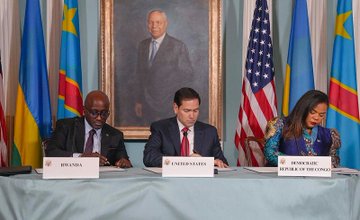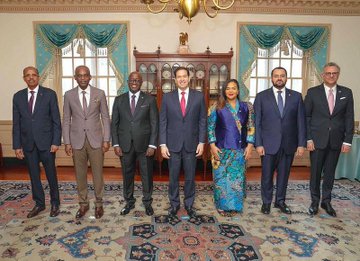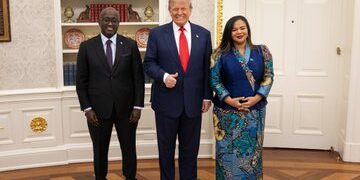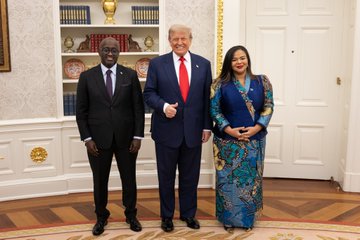Washington, D.C. — In a momentous milestone for African peace and global diplomacy, President Donald J. Trump on Friday hosted the Foreign Ministers of Rwanda and the Democratic Republic of the Congo (DRC) at the White House to sign a peace agreement ending three decades of deadly conflict between the two nations.
“In a few short months, we’ve now achieved peace between India and Pakistan, Israel and Iran, and the DRC and Rwanda,” President Trump announced from the Oval Office. “Today, the violence and destruction come to an end, and the entire region begins a new chapter of hope.”
The agreement, witnessed by the United States Government, sets a roadmap for peace, disarmament of rebel groups, and regional economic integration. It is the culmination of extensive mediation efforts led by the Trump Administration, supported by the African Union and regional stakeholders.

The DRC’s Foreign Minister, Thérèse Kayikwamba Wagner, expressed profound gratitude: “Thank you and congratulations indeed for this remarkable milestone, which is putting an end to 30 years of conflict and of suffering.”
Rwandan Foreign Minister Olivier Nduhungirehe told President Trump, “There have been many mediations, facilitations in the past, but none of them succeeded, and we believe it’s because of your leadership and steadfast commitment to this process.”
Vice President JD Vance echoed the sentiment: “Under President Trump’s leadership, we’ve taken what was 30 years of killing and war… and now we’re on a pathway to peace.”
From Conflict to Cooperation

The peace agreement lays out several binding commitments, including: Mutual Respect for Sovereignty: Both nations agree to respect each other’s territorial integrity and end all hostile activities. Disarmament and Reintegration: Armed groups, including the notorious FDLR, will be demobilised with support from ongoing negotiations in Doha, Qatar.
Joint Security Coordination: A new DRC-Rwanda Joint Security Mechanism will oversee disarmament, intelligence-sharing, and peace enforcement. Humanitarian Access: Safe return of refugees and internally displaced persons, and guarantees for humanitarian agencies.
MONUSCO Collaboration: UN peacekeeping operations in the region will be reinforced. Economic Integration: Within three months, the countries will launch a bilateral economic framework tied to broader regional trade, resource transparency, and infrastructure development.
Regional Implications
The DRC-Rwanda agreement may have ripple effects throughout Africa’s Great Lakes Region, long plagued by ethnic tensions, mineral-fueled violence, and cross-border insurgencies. The agreement draws directly from the Luanda Process, the Doha talks, and the African Union’s frameworks.
Secretary of State Marco Rubio stated: “Whether it’s been in Ukraine and Russia, whether it’s been Pakistan/India, whether it’s been Iran and Israel, and in the continent of Africa, President Trump’s priority has been on peace, and today we see this come to fruition.”
A Ground-Level Shift
Journalist Hariana Veras—a native of the Democratic Republic of the Congo and White House reporter—described what she’s seen on the ground in the DRC upon news of the peace agreement, brokered by the Trump Administration: “They have hope now, for a better day in Congo.”
President Trump later signed letters to Rwanda President Paul Kagame and DRC President Félix Tshisekedi congratulating them on settling the decades-long conflict between their two nations.
He commended their courage and invited them to Washington for a formal state visit to mark the new era of bilateral cooperation.
The agreement comes into force immediately and establishes a Joint Oversight Committee comprising representatives from the U.S., Qatar, and the African Union to monitor implementation.
As the two African neighbours embrace this historic new dawn, the world watches with cautious optimism—and hope that the wounds of the past can finally begin to heal.









